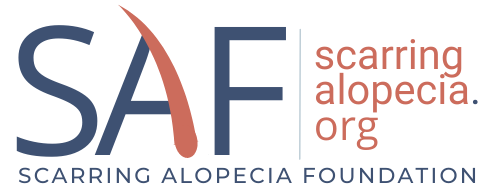Common Ingredients in Shampoos and Conditioners Can Make Inflammation Worse in Lichen Planopilaris (LPP) and Frontal Fibrosing Alopecia (FFA)
By James Pathoulas, Kelly Flanagan, and Dr. Maryanne Senna
An allergen is a substance that causes an inflammatory reaction when it contacts the body. Signs of an inflammatory reaction on the scalp include redness, itching, and dandruff-like flaking or scale. Many natural and human-made items can be allergens including certain foods, clothes, and chemical ingredients in lotions, soaps or other personal care products. Each person reacts differently to allergens.
While some people do not react to allergens, the inflammation caused by allergens in other people ranges from mild and simply irritating to severe and life threatening. Dr. Maryanne Senna and her colleagues at the Massachusetts General Hospital (MGH) investigated if common allergens were causing inflammation in patients with lichen planopilaris (LPP) and frontal fibrosing alopecia (FFA). To study this, some patients with LPP and FFA underwent a test called patch testing. Patch testing is a type of allergy test where individual potential allergens are applied on small discs that are taped to a patient’s back skin. After 48 and 72 hours, if a patient develops redness and inflammation on the skin where a substance/disc is applied, the patient is considered allergic to that substance.
In the MGH study, 42 patients with LPP and/or FFA had patch testing. The substances applied to the back were potential allergens found in personal care products (shampoo, hair dye, facial make up, moisturizer, etc.) commonly used on the head and neck. Surprisingly, 76% of patients were found to have at least one positive reaction to an ingredient in a personal care product they were using.
Interestingly, 26% of people with LPP/FFA were allergic to an ingredient called gallates and 19% to an ingredient called linalool. Gallates are preservatives commonly added to soaps, shampoos, conditioners, lotions, and other personal care products. Similarly, linalool is a fragrance that is commonly added to personal care products. This was an important finding because it showed that people with LPP and FFA are more likely to be allergic to these common substances in personal care products compared to those without LPP or FFA. Other chemicals that LPP/FFA patients were found to be commonly allergic are listed below.
Importantly, after the patients found out which substances they were allergic to, they avoided them for three months. Without changing anything else about their LPP/FFA treatment regimen, after three months of allergen avoidance, 59% of patients had decreased scalp itch and more than 70% of patients had decreased scalp redness. LPP and FFA occur because of inflammation. Dr. Senna’s study found that 76% of tested patients had at least one allergic reaction to ingredients in their personal care products used on the head and neck. This is much higher than the allergic reactions seen in the general population (ie. those without LPP/FFA). When patients with LPP and FFA avoided certain allergens, their signs of scalp inflammation improved. The study also discovered that patients with LPP and FFA are more likely to be allergic to certain common ingredients in personal care products.
While these results do not prove that these allergens/personal care product ingredients cause LPP/FFA, it does seem that at a minimum they are adding inflammation to an inflammatory condition. Since there are no benefits to having these ingredients in products, we recommend avoiding products with certain potentially allergic ingredients on the head and neck. The results of this study may be helpful to people with LPP and FFA and have inspired new studies looking at allergens in LPP and FFA. To read the full publication, click here.
There are many excellent hair, skin, and nail products that you can purchase over the counter. However, some products can contain ingredients that lead to inflammation.
Through our research at Massachusetts General Hospital, we found that people with lichen planopilaris (LPP) and frontal fibrosing alopecia (FFA) are more likely to be allergic to certain ingredients commonly found in personal care products compared to people without LPP and FFA. If you have LPP or FFA, it may be helpful to use shampoos, conditioners, hairsprays, leavein products, and facial products that do not have these allergens.
Below, we provide a list of the most commonly identified allergens in our LPP/FFA patient population. Not all patients are allergic to these ingredients and some patients may have allergies to different ingredients. Contact allergy patch testing with a board -certified dermatologist may be performed for individuals who are interested in obtaining their individual results.
AVOID FRAGRANCES
Sometimes “Fragrance” may not be listed in the ingredients and instead one of these ingredients will be listed:
- Citronellol / Farnesol
- Citral
- a-Hexylcinnamicaldehyde
- Geraniol Cinnamyl alcohol
- Oak moss
- Lyral Limonene
- Cinnamaldehyde
- Isoeugenol a-Amylcinnamaldehyde Linalool
- Hydroxycitronellal
- Eugenol
- Coumarine
AVOID FORMALDEHYDE RELEASERS INCLUDING:
- Quaternium-15
- DMDM hydantoin
- Imidazolidinyl urea
- Diazolidinyl urea
- Polyoxymethylene urea
- Sodium hydroxymethylglycinate
- Bromopol
AVOID HAIR COLOR/DYES AND OTHER PRODUCTS WITH THE FOLLOWING INGREDIENTS:
- Ammonium persulfate Paraphenylenediamine (PPD)
- Methylchloroisothiazolinone (MCI/MI)
USE ZINC-CONTAINING MINERAL SUNSCREENS, FACIAL MOISTURIZES, AND MAKEUP WITH SPF.
IT IS BEST TO USE FRAGRANCE FREE PRODUCTS.
AVOID THE FOLLOWING:
- Gallate mix
- Dodecyl gallate
- Octyl gallate
